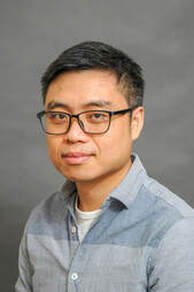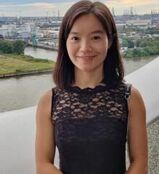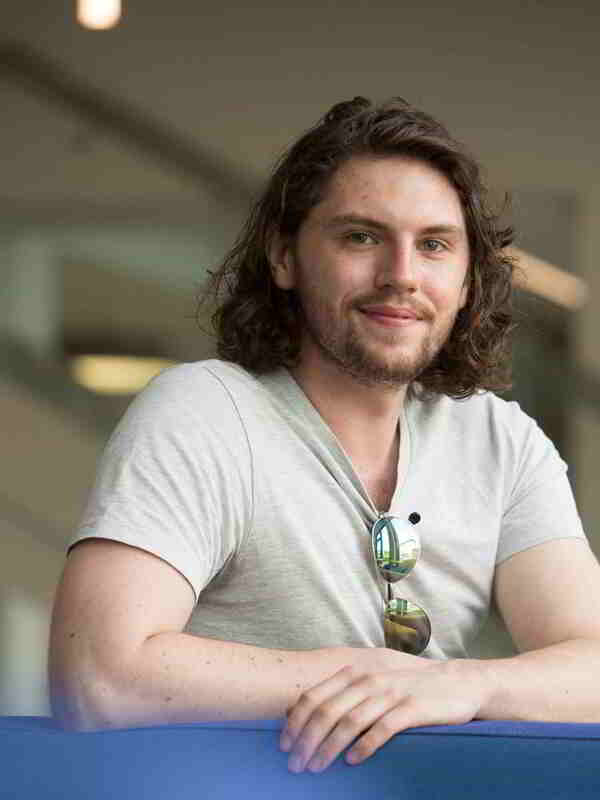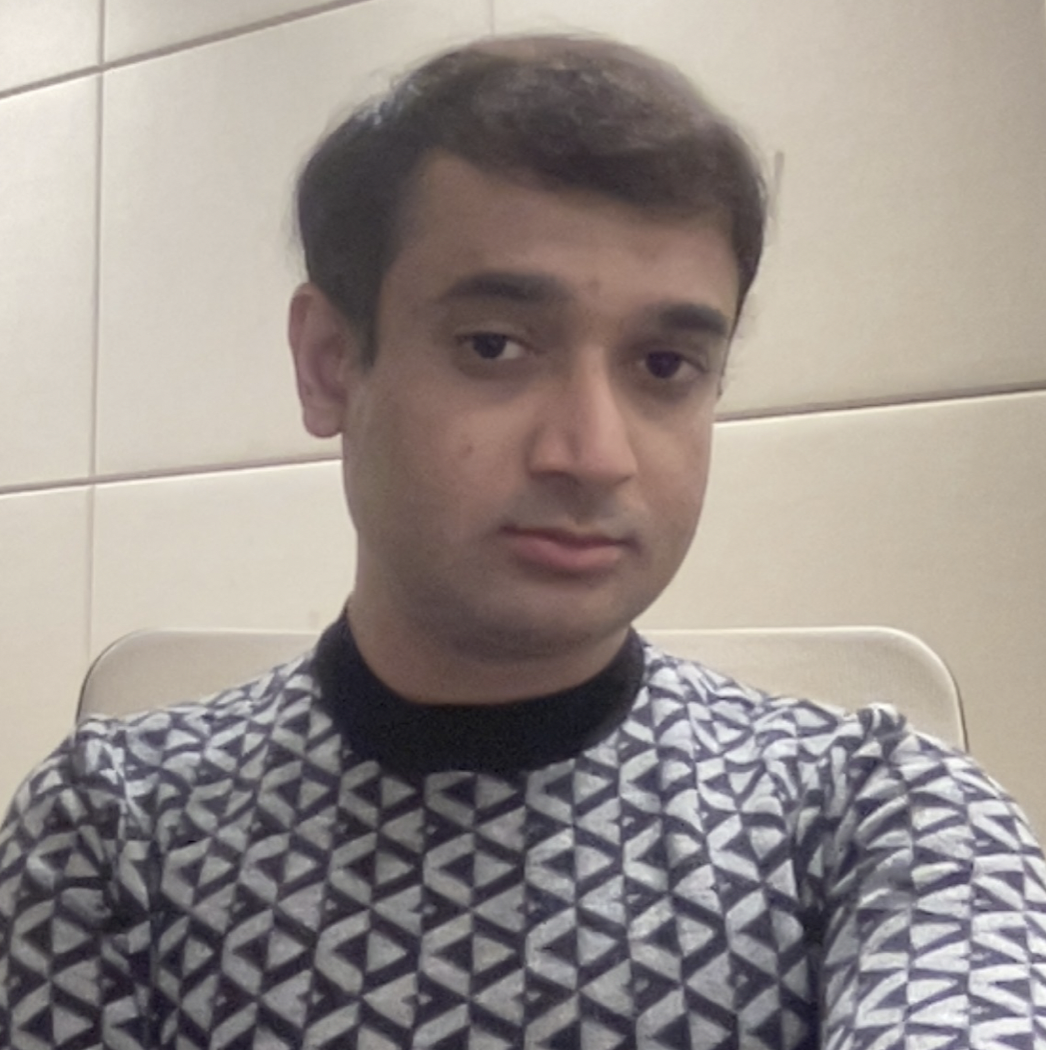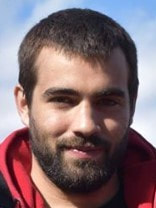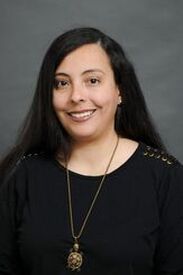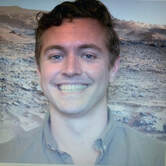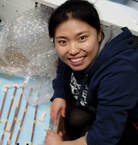Stable Isotope Lab Personnel
Research Associate
|
Dr. Weibin Chen
E-mail: [email protected] My ongoing research interests focus on developing or applying mechanistic modeling for understanding geochemical cycles of life elements (e.g., C, H) driven by various water-rock interactions and their implications on prebiotic conditions or life habitability in deep crustal fracture fluids within Precambrian crust environments or similar conditions on other planets. By mathematically incorporating the sources of different elements, the reaction network hypothesized or confirmed to define geochemical cycles, and the rate and isotope fractionation factors of chemical reactions involved within the reaction network, this modeling approach simulates the compositional and isotopic dynamics as a function of time and environmental conditions (e.g., pH, salinity, and temperature). The application of such a modeling approach is versatile, including numerically differentiating the abiogenic from biogenic controls on compositional and isotopic signatures, which is essential for life activity detection or habitability evaluations. Additionally, working together with fluid mechanics engineers in our group, I am interested in integrating single- or multi-element compound-specific isotope analysis (CSIA) into the reactive transport modeling (RTM) framework for quantitatively evaluating the remediation of chlorinated volatile organic compounds (cVOCs) in groundwater. A particular interest is coupling the biokinetic model to a position-specific isotopologue-based, multi-phase RTM for simulating the remediation of a large family of chlorinated benzenes and the consequent change in C-Cl isotopologue speciation at a complex site where sorption/desorption or back diffusion is an influential input process of legacy contaminants. |
Postdoctoral Fellows
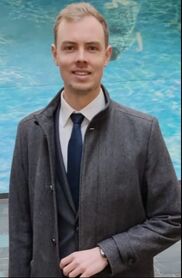
Dr. Jonas Brünjes
E-mail: [email protected]
My research project focuses on investigating the composition and cycling of ancient organic matter in Precambrian Shield rocks and deep fracture fluids in the continental subsurface. Some of these deep groundwaters have been isolated for up to hundreds of millions, and even billions, of years – understanding processes involved in organic matter cycles on these planetary timescales could provide insight into early Earth history and potentially habitable extraterrestrial environments. One of my main research objectives is to investigate the cycling and incorporation of sulfur in organic matter in the deep subsurface by examining the stable isotopic composition of carbon and sulfur. To understand and characterize the organic matter composition at a molecular level, I apply a variety of complementary methods, such as ultrahigh-resolution mass spectrometry and fluorescence spectroscopy, and evaluate the large resulting datasets using modern data science tools and multivariate statistics.
E-mail: [email protected]
My research project focuses on investigating the composition and cycling of ancient organic matter in Precambrian Shield rocks and deep fracture fluids in the continental subsurface. Some of these deep groundwaters have been isolated for up to hundreds of millions, and even billions, of years – understanding processes involved in organic matter cycles on these planetary timescales could provide insight into early Earth history and potentially habitable extraterrestrial environments. One of my main research objectives is to investigate the cycling and incorporation of sulfur in organic matter in the deep subsurface by examining the stable isotopic composition of carbon and sulfur. To understand and characterize the organic matter composition at a molecular level, I apply a variety of complementary methods, such as ultrahigh-resolution mass spectrometry and fluorescence spectroscopy, and evaluate the large resulting datasets using modern data science tools and multivariate statistics.
|
Dr. Min Song
E-mail: m[email protected] My research focuses on exploring water-rock reactions including radiolytically driven reactions in deep crustal fracture waters within Precambrian Shield rocks, and their impacts on deep C, S, H cycles and subsurface habitability. By “following the water”, I and my co-workers use water isotope analysis and other aqueous geochemical and hydrogeological tools, along with laboratory-based experiments to explore to what degree deep crustal environments may be connected or disconnected with the surface environments, and the corresponding impact on subsurface life and biogeochemistry. My current and future research will also apply laboratory simulation and modeling approaches to investigate the potential mechanisms and rates of water-rock reactions, and the influences of minerals, host rock types and porosity, etc. on the production of potential electron donors (e.g., H2, acetate) and electron acceptors (e.g., SO42-) that are capable of sustaining subsurface ecosystem over geological timescales. The long-term goal of my research is to gain insights on prebiotic chemistry, life’s origin and co-evolution with its environments over Earth’s history. |
|
Dr. Pete Higgins
E-mail: [email protected] I examine how thermodynamic principles control whether or not life can survive, grow and/or evolve in various physico-chemical settings. To do so, I develop and employ computational models which: i) assess dynamic habitability, ii) constrain possible biomass levels, and iii) estimate biosignature production and detectability against an abiogenic background. The universal nature of these laws allows us to apply such techniques to environments throughout the cosmos, from deep earth through deep time, to the oceans of icy moons in the outer solar system, and even exoplanets around distant stars. |
|
Dr. Sourojeet Chakraborty
E-mail: [email protected] I apply transport phenomena and scaling theory to identify key insights and progress in the field of contaminant remediation. Chlorinated volatile organic compounds (cVOCs) are widespread pernicious contaminants of particular concern and research, owing to their toxicity and carcinogenicity. Traditionally, mathematical approaches to model contaminant transport of cVOCs have been restrained to consider advective, inertial and gravity contributions. However, calculation of some typical dimensionless numbers (Sherwood, Schmidt, Damkohler, etc.) reveals that other contributions such as reaction kinetics, viscous diffusion, mass transfer, etc. may become dominant transport mechanisms for these species. Incorporation of these additional mechanisms into existing modeling frameworks will aid the interpretation of concentration and compound-specific isotope analysis (CSIA) data for understanding and quantifying the cVOCs degradation in complex field conditions. |
Some Past SILers
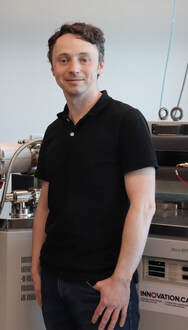
Dr. Oliver Warr
Research Associate
I am applying my intellectual, analytical, and field research skill set which covers noble gases (He, Ne, Ar, Kr, Xe), stable isotope (C,H, N) geochemistry of gases and fluids and clumped methane isotopes, to continue to investigate how they can be applied in innovative ways to better understand the origin, evolution, and habitability of deep crustal fracture fluids within Precambrian crust environments. I am also exploring the potential for these environments to act as proxies for understanding overall planetary processes on Earth and beyond (e.g. Mars). The geochemical toolkit I use incorporates, hydrogen, carbon, nitrogen, noble gases, biomass, radiocarbon, oxygen, sulphur, methane clumped isotopes, trace metals, cations, and anions.
Specifically, my published and future research focusses on long-term unconventional hydrocarbon production, natural analogues to CCS and nuclear waste storage facilities, and subsurface fluid formation, evolution, and migration. This involves leading field teams to remote locations globally, including active mines at depths up to 3 km to investigate fluid residence times, fluid volumes, and the extent of water-rock interactions within the crystalline basement.
Current Position: Assistant Professor, Department of Earth and Environmental Science, University of Ottawa
email: [email protected]
webpage: https://sites.google.com/view/warr-lab/
Research Associate
I am applying my intellectual, analytical, and field research skill set which covers noble gases (He, Ne, Ar, Kr, Xe), stable isotope (C,H, N) geochemistry of gases and fluids and clumped methane isotopes, to continue to investigate how they can be applied in innovative ways to better understand the origin, evolution, and habitability of deep crustal fracture fluids within Precambrian crust environments. I am also exploring the potential for these environments to act as proxies for understanding overall planetary processes on Earth and beyond (e.g. Mars). The geochemical toolkit I use incorporates, hydrogen, carbon, nitrogen, noble gases, biomass, radiocarbon, oxygen, sulphur, methane clumped isotopes, trace metals, cations, and anions.
Specifically, my published and future research focusses on long-term unconventional hydrocarbon production, natural analogues to CCS and nuclear waste storage facilities, and subsurface fluid formation, evolution, and migration. This involves leading field teams to remote locations globally, including active mines at depths up to 3 km to investigate fluid residence times, fluid volumes, and the extent of water-rock interactions within the crystalline basement.
Current Position: Assistant Professor, Department of Earth and Environmental Science, University of Ottawa
email: [email protected]
webpage: https://sites.google.com/view/warr-lab/
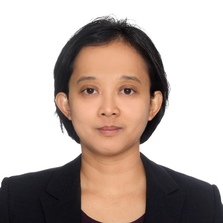
Dr. Joan De Vera
The primary objective of my research is to contribute to the understanding of the degradation of toxic organic contaminants in the environment using compound-specific isotope analysis (CSIA). To this end, one of my research projects uses CSIA and mathematical modelling to assess the _in situ_ biodegradation of chlorinated benzenes at a contaminated groundwater site. I am also interested in learning the role of trace metals in the biodegradation of organic contaminants. More specifically, I am exploring the cobalt-Vit. B12 interaction and how this affects the reductive dehalogenation of chlorinated organic contaminants. These works have important implications for management/remediation of contaminated field sites.
Current Position 2022: Posdoctoral Fellow, Earth Sciences, University of Southern California
The primary objective of my research is to contribute to the understanding of the degradation of toxic organic contaminants in the environment using compound-specific isotope analysis (CSIA). To this end, one of my research projects uses CSIA and mathematical modelling to assess the _in situ_ biodegradation of chlorinated benzenes at a contaminated groundwater site. I am also interested in learning the role of trace metals in the biodegradation of organic contaminants. More specifically, I am exploring the cobalt-Vit. B12 interaction and how this affects the reductive dehalogenation of chlorinated organic contaminants. These works have important implications for management/remediation of contaminated field sites.
Current Position 2022: Posdoctoral Fellow, Earth Sciences, University of Southern California
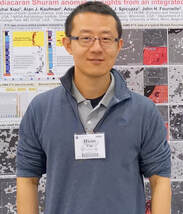
Dr. Huan Cui
(Co-Supervised with Dr. Benedicte Menez IPGP Univ. Paris)
I conduct multidisciplinary research that integrates sedimentology, stratigraphy, geochemistry, and paleontology to investigate the co-evolution of environment and life in Earth history. Fundamental in my projects is the emphasis of first-hand field-based investigations and a hypothesis-driven approach. The multidisciplinary nature of my research requires a holistic understanding of the Earth-life system at both micro- and macro-scales in deep time. In Barbara's group, I will employ various techniques, including SIMS (secondary ion mass spectrometry) and stable isotopes, to explore biosignatures in deep Earth.
New Position 2022: Assistant Professor, Department of Geosciences, Mississippi State University
(Co-Supervised with Dr. Benedicte Menez IPGP Univ. Paris)
I conduct multidisciplinary research that integrates sedimentology, stratigraphy, geochemistry, and paleontology to investigate the co-evolution of environment and life in Earth history. Fundamental in my projects is the emphasis of first-hand field-based investigations and a hypothesis-driven approach. The multidisciplinary nature of my research requires a holistic understanding of the Earth-life system at both micro- and macro-scales in deep time. In Barbara's group, I will employ various techniques, including SIMS (secondary ion mass spectrometry) and stable isotopes, to explore biosignatures in deep Earth.
New Position 2022: Assistant Professor, Department of Geosciences, Mississippi State University
|
Dr. Jethro Sanz-Robinson I study the mechanisms and rates of abiotic hydrocarbon formation in Earth’s oceanic and continental lithosphere. I am currently analyzing the stable carbon and hydrogen isotope signatures of light hydrocarbon gases found in fluid inclusions and deep fracture fluids from the Sudbury Igneous Complex (SIC) in Canada. This research is being undertaken to better understand the role that abiotic methane plays in biogeochemical cycling and the sustenance of subsurface life on our planet. Current Position 2021: Golder Environmental Consultants |
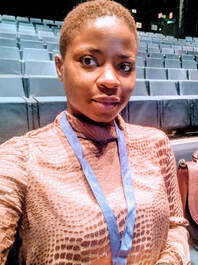
Dr. Alero Gure
My research interests are inspired by the life-energy-environment interdependence. My work as a postdoctoral fellow involves integrating fluid data collected from deep subsurface environments into thermodynamic models to constrain the biotic and abiotic contributions to the signatures of those systems. One objective is to identify and develop new connections between deep subsurface and near-surface environments while considering variations in parameters that are unique to these distinct systems.
Current Position 2021: Golder Environmental Consultants
My research interests are inspired by the life-energy-environment interdependence. My work as a postdoctoral fellow involves integrating fluid data collected from deep subsurface environments into thermodynamic models to constrain the biotic and abiotic contributions to the signatures of those systems. One objective is to identify and develop new connections between deep subsurface and near-surface environments while considering variations in parameters that are unique to these distinct systems.
Current Position 2021: Golder Environmental Consultants
|
Dr. Nivea Magalhães
I am a stable isotope scientist, with experience in sulfur, carbon, and hydrogen isotope systematics. My main goal during my postdoctoral research time is to learn more about deep subsurface fluids of SE Brazil, which I have sampled from two active mines. Studies in different areas around the globe have shown the potential for ancient fluids to be preserved within fractures in the rocks. I am keen to understand the (bio)geophysical mechanisms and processes surrounding how these deep crustal fluids in Brazil have formed, how they evolved over time, and how we might be able to relate them to a global framework of the deep subsurface. Current Position 2020: Laboratory Manager, University of St. Andrew’s Scotland |
Recent Graduate Students
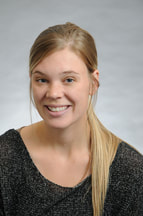
Elizabeth Phillips
PhD, University of Toronto, 2021
NSERC PGS Scholarship 2018-2021
Current Position: Nordvulk Postdoctoral Fellow at University of Iceland

